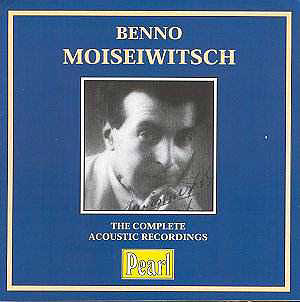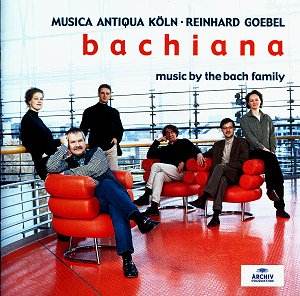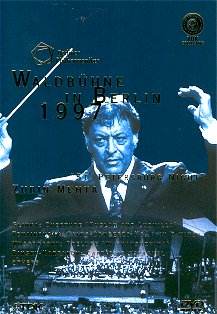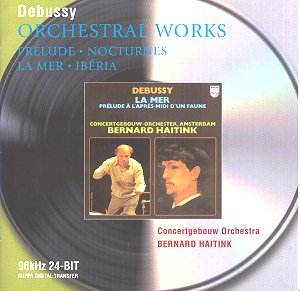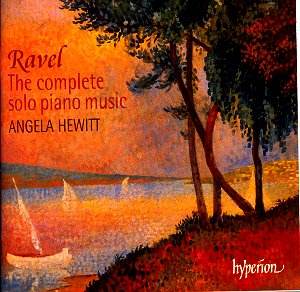 Composer: Maurice Ravel
Composer: Maurice Ravel
Works: Menuet antique, Pavane pour une infante défunte, Sonatine, Valses nobles et sentimentales, Le Tombeau de Couperin, Sérénade grotesque, Jeux d’eau, Gaspard de la nuit, Menuet sur le nom d’Haydn, Prélude, À la manière de Borodine, À la manière de Chabrier, Miroirs
Performers: Angela Hewitt (piano)
Recording: Recorded in Reitstadel, Neumarkt, Germany, 20-23 March 2000, and Henry Wood Hall, London, 11-14 August 2001
Label: Hyperion
Maurice Ravel, a quintessential figure of early 20th-century French music, crafted an oeuvre that is as rich in harmonic innovation as it is in evocative imagery. His piano works encapsulate a myriad of influences—from the impressionistic brushstrokes of Debussy to the intricate textures reminiscent of French baroque music. This complete solo piano recording by Angela Hewitt offers a comprehensive survey of Ravel’s solo piano music, presenting not only his most celebrated pieces but also lesser-known gems that illuminate his stylistic evolution.
Hewitt’s interpretation is marked by a meticulous attention to detail that showcases her deep understanding of Ravel’s idiomatic language. The opening track, “Menuet antique,” is presented with the poised elegance of a courtly dance, capturing Ravel’s nod to the baroque while infusing it with the subtle nuances that characterize her playing. This balance between historical fidelity and personal expression is a hallmark of Hewitt’s artistry, evident throughout the collection. Her performance of “Pavane pour une infante défunte” is particularly noteworthy; the delicate phrasing and soft pedaling evoke a sense of nostalgia without slipping into sentimentality, a tribute to both Ravel’s original intent and her interpretative choices.
The more technically demanding “Gaspard de la nuit” reveals the full range of Hewitt’s pianistic capabilities. In “Ondine,” she conjures an ethereal quality, allowing the cascading notes to shimmer with the fluidity of water, though her approach is decidedly less flamboyant than that of her contemporaries, such as Martha Argerich or Ivo Pogorelich, who often emphasize a more dramatic dynamic contrast. Hewitt’s restraint allows for a lyrical interpretation that emphasizes clarity and texture over sheer volume, presenting “Le gibet” as a haunting tableau where every note feels weighty with meaning. Her nuanced touch in “Oiseaux tristes” effectively translates the imagery of the piece, capturing the density of the forest without overwhelming the listener—a delicate balancing act that speaks to her deep musicality.
The recording quality is of the highest order, as expected from Hyperion. Hewitt’s piano sounds remarkably true to life, with a clear delineation of tonal colors and a well-defined spatial presence that allows the subtleties of her touch to resonate. The engineering captures the nuances of her dynamic range, from the softest whispers to more assertive passages, ensuring that the listener can appreciate the full spectrum of Ravel’s harmonic palette.
When compared to Jean-Yves Thibaudet’s more extroverted interpretations, Hewitt’s performances may initially seem understated. Thibaudet’s approach often revels in rich, orchestral colors that might appeal to those seeking a more dramatic presentation. However, Hewitt’s interpretations possess a quiet intensity that rewards careful listening, revealing layers of complexity and emotional depth that are sometimes obscured by more flamboyant styles.
Angela Hewitt’s complete recording of Ravel’s solo piano music stands as a testament to her interpretative insight and technical prowess. Her ability to navigate the intricate textures and emotional landscapes of Ravel’s compositions with both clarity and sensitivity marks this collection as essential listening for anyone interested in the piano repertoire. The exquisite detail in her playing, coupled with the superb quality of the recording, ensures that this release is not merely a compilation of pieces but a coherent exploration of Ravel’s musical world.
